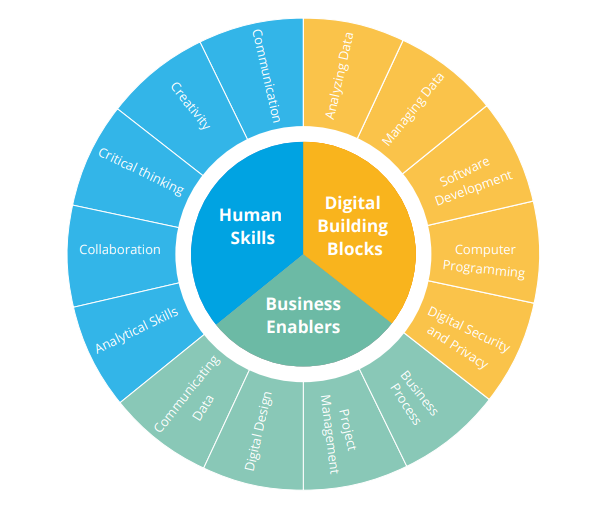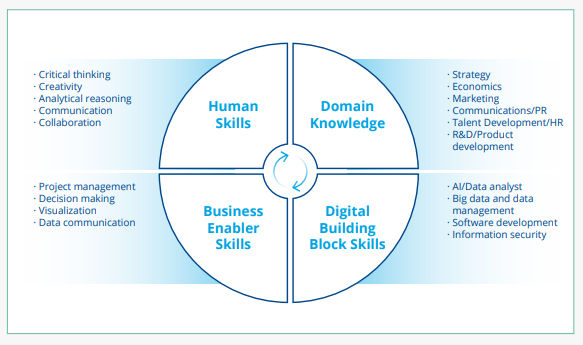In 2018, the Business-Higher Education Forum (BHEF) commissioned Burning Glass Technologies to examine skills in the job market by analyzing 56 million resumes and 150 million unique U.S. job postings, dating back to 2007. The goal of the study was to identify the new foundational skills of the digital economy by attempting to answer the following questions.
- How and when do evolving skills change the job market?
- Which skills are in demand in both digitally intensive jobs, and more broadly?
- Which skills retain their value over time?
- If such critical skills exist, how do the skills interact, and what do they mean for job seekers, employees, educators, and employers?
The research identified 14 skills that have become foundational in the new economy. They fall into three major categories: Human skills, Business skills, and Digital skills. These foundational skills play major roles in the economy and are in high demand in multiple sectors. They can greatly increase the value of job seekers and employees advancing their career when used in combination.
Human Skills
Apply social, creative and critical intelligence. These skills – critical thinking, creativity, communication, analytical skills, collaboration, and relationship building – appear on many lists of sought-after “soft skills,” and are still in high demand across the digitally intensive economy.
- Often drive automation and technology, rather than being driven by it
- Are more likely – not less – to be in demand in digitally intensive jobs
- Are essential to the success of teams and enterprises
- Are valued by employers and educators for workers at all levels
- Are the most transferable of all New Foundational Skills
- Can be applied across any other skill set or work context
- Are the hardest to connect to specific career opportunities or jobs in the digital economy
- Are useful across most jobs, but must be complemented by other skills
- Unlike the other New Foundational Skills, are not yet treated as measurable competencies that can be taught and learned
Digital Building Block Skills
Are critical to many vocations, and increasingly useful outside traditional digitally intense job families. These skills are especially useful to current or aspiring functional analysts and data-driven decision makers. These skills include analyzing data, managing data, software development, computer programming, and digital security and privacy.
- Represent essential skills for those who seek to thrive in the digital economy
- Are great for getting one’s foot in the door
- Often have credentialing systems that signal efficiently and align with a clear progression of skills
- Serve as a reliable means to earn more, and to advance professionally, across job families
- Have high salary premiums: computer programming and software development offer the greatest salary bumps of any New Foundational Skills
- Enable individuals to adapt and leverage new technologies
Business Enabler Skills
Play a synthesizing, integrative role in the workplace. These skills allow the other skills to be put to work in practical situations, and include project management, business process, communicating data, and digital design.
- Act as connective tissue between people with disparate skills and roles
- Close technological, knowledge, and communication gaps
- Function as a set of bridges between roles, workers, teams, and domains
- Inform R&D with consumer, marketplace, and business insight
- Apply the creative power of digital science to the overall business enterprise
- Unlock, add, and communicate the value of digital technologies
The 14 New Foundational Skills
The skills identified are already sought after in most jobs across the economy, regardless of their relation to the digital economy. Although these skills show up frequently in postings from the digitally intensive areas of the economy, most actually fall outside of the digital economy. For nine of the skill areas, most job openings are outside of the digital IT and analysis job families, confirming that the demand for digital skills goes well beyond the tech economy.
Job seekers and employees need skills from each of the three skill groups in order to thrive, but less than a fifth currently claim skills in all three groups on their resumes. Those who develop these skills earn significantly more.
Employers and jobseekers appear to place very different value on these skills-at least based on the signals they send. Employers often seek these skills in job postings but resumes show that most jobseekers claim very few of them. It is not clear whether jobseekers do not possess these skills, or simply fail to emphasize them, but either way this mismatch between the skills signaled by jobseekers and the skill requirements signaled by employers strongly suggests that opportunities are being missed.
These skills will increase in value and importance as a person becomes more proficient and advance in their career.

The Blended Digital Professional
The blended digital professional is someone who combines Human, Business Enabler, and Digital Building Block Skills with domain knowledge that is specific to a company, organization, or workforce.
Competency or expertise in any of the three new foundational skill areas can be paired with domain-specific knowledge – in any sector of the economy, in a wide array of industries and workplaces – to create the role of a “blended digital professional.”
In this model, the three foundational skill areas provide the base of competency or expertise necessary to adapt to new domains, and to new jobs or opportunities, throughout one’s career.

Recommendations for job seekers and employees
- Recognize the importance of the New Foundational Skills for career adaptability and flexibility as technologies shift and job functions change. Continuously identify strategies to acquire essential skills.
- Identify gaps in current knowledge around new foundational skill areas.
- Develop strategies, using internal training, boot camps, or employers’ education benefits, to continuously acquire new skills.
- Learn to effectively communicate with, and learn from, digitally savvy peers.
- Position yourself for career growth by gaining experience with adjacent tasks and functions that require the development of new skills.
- In resumes and other presentations, emphasize confirmed levels of competency, including certifications, in each of the three groups of New Foundational Skills.
Recommendations for employers
- Aggressively signal skill demands and restructure their hiring plans to attract and develop talent and skills to power their digital business strategy.
- Recognize that the New Foundational Skills are critical to core business activities and company competitiveness.
- Ensure that all formal job postings include the New Foundational Skills as essential for the performance of job responsibilities.
- Conduct periodic digital skills assessments and develop individualized learning plans for all job seekers and incumbent employees; engage learning and training partners in the use of these tools.
- Seek new and more diverse sources of skills and talent, by leveraging the adjacent skills of both job seekers and incumbent workers.
- Expressly develop work-based learning that expands opportunities to link learning to work and develop these skills in the workforce.
- Communicate the role of these skills, and of these clusters of skills, to all levels of job seekers and incumbent employees, across companies and industries.
- Work closely with higher education partners and other providers to coordinate goals and expectations for classroom learning, internships, job skills development, and work-based learning – particularly in technical programs seeking to develop Business Enabler Skills or Human Skills, and in liberal arts or general education programs hoping to stress Business Enabler Skills or Digital Building Block Skills as key skills of the future.
You can read the full report here.




